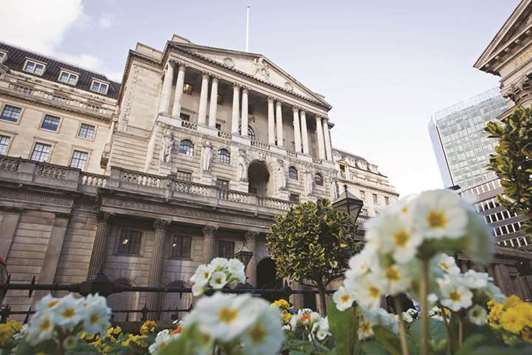The Bank of England’s unanimous decision to raise interest rates this month has led economists to predict an additional two hikes next year.
A survey of 31 economists by Bloomberg shows the majority expect the benchmark rate to reach 1.25% by the end of 2019, a quarter-point higher than in the July survey. The first move from the current 0.75% is forecast for the second quarter — after the UK’s planned exit from the European Union — suggesting that concerns a harsh Brexit will prevent the central bank from continuing its “limited and gradual” tightening path may be overdone.
“The difficult thing is Brexit,” said Victoria Clarke, an economist at Investec in London. “But we’re not expecting a big shock. That gives the BoE reassurance to push forward.”
The prediction for an extra rate increase comes despite criticism from people, including former BoE policy makers, who said the bank should have held off further tightening. Data since the decision showed growth slowed in July, with the dominant services sector losing momentum entirely, and wages have proved weaker than expected.
Added to that is the risk the UK government is unable to reach a deal with the EU that will allow Britain to transition out of the world’s largest trading bloc gradually. “It may not need it, but falling inflation will give the Bank of England one reason to keep rates on hold until May. Another is Brexit. Should that unfold smoothly, the path will be clear for another hike in November next year,” said Jamie Murray of Bloomberg Economics.
All nine members of the Monetary Policy Committee voted to raise rates for the second time in less than a year at their August meeting. While Governor Mark Carney reiterated his pledge for a moderate pace of hikes, he wouldn’t rule out another increase before he steps down from the BoE in June.
Despite warning of the risks of no-deal Brexit, up to now the BoE has opted to work on the assumption that it’ll be a smooth process, which means the UK’s economic expansion will continue and tight labour markets and limited spare capacity will put upward pressure on prices.
Investec’s Clarke was among the majority of economists that had expected a more divided MPC vote on August 2, and says the surprise unanimous decision may have persuaded some of her peers that policy makers could feel confident enough to act twice next year.

White primroses grow in a flower bed outside the Bank of England in London. A survey of 31 economists by Bloomberg shows the majority expect the benchmark rate to reach 1.25% by the end of 2019, a quarter-point higher than in the July survey.
